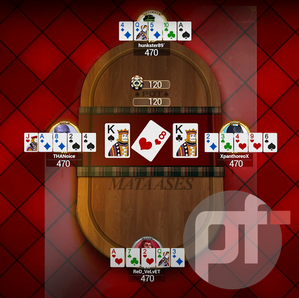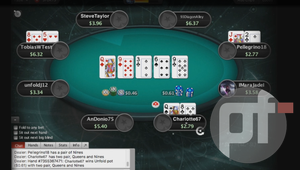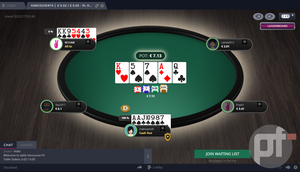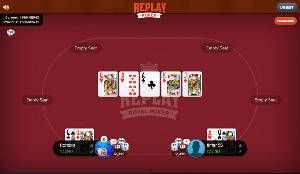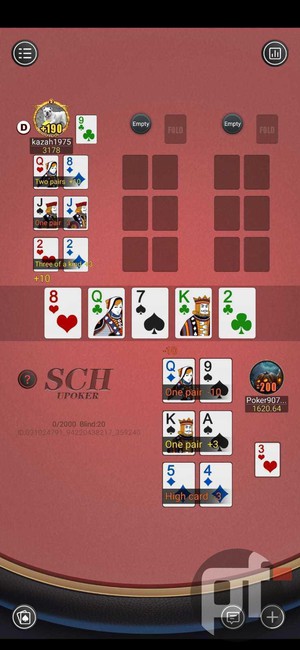

Poker boasts a plethora of variations, from classics like Seven-Card Stud or 5-Card Draw to novelty options like Short Deck Poker or Five Card Omaha Hi/Lo.
While no doubt Hold’em and Omaha hold widespread popularity, operators and poker rooms regularly introduce new and creative poker variants to keep the game exciting and fresh. These new offerings cater to both seasoned players seeking novel challenges and newcomers eager for unique experiences.
In this article, we list out some of the wildest and craziest poker variants offered by online operators, ranging from mind-bending twists on classic games to entirely new creations, each offering a unique perspective on the game of poker.
1) Mata Ases by Upoker
Mata Ases, also known as “Kill Aces,” tops our list as one of the weirdest poker variants. Exclusive to the Asian social poker app Upoker, this No-Limit variation originated in Mexico and blends elements of Hold’em and Stud.
The goal of the game is to form the strongest possible five-card poker hand, with a minimum ranking of a pair of Aces or better.
Players are dealt two cards, one face up and one face down, followed by a flop of three cards dealt face down in the middle. Betting begins with the player holding the highest card, and each subsequent round sees additional cards dealt, with players allowed only one face-down card at a time. Therefore, if a player opts for a new card to be face down, they must reveal the previously hidden card.
The three cards that are in the middle are now revealed and the second round of betting action begins, starting again with the player boasting the highest poker card.
This sequence repeats until every player holds five cards — four visible and one concealed. At this point, each player completes their best 5-card poker hand, for which they can use only one or none of the community cards.
To win the hand, a player must have a minimum ranking of a pair of aces or better. The player holding the best hand takes the pot. If no player meets this minimum requirement, the pot carries over to the next hand, unless all players agree to split it.
Although the rules may seem intricate, Mata Ases encourages a high level of action. Typically played with four players, this format has swiftly gained popularity within the poker community over the years.
2) Super Hold’em by PokerBaazi
Super Hold’em stands out as one of the most unconventional poker variants due to its ability to produce scenarios where two players can simultaneously hold flushes, straight flushes, or even royal flushes in the same hand.
The format bears resemblance to Pineapple, wherein players receive three hole cards pre-flop but are required to discard one by showdown. However, unlike Pineapple, players retain all three cards at showdown.
Moreover, players have the flexibility to use any combination of their three hole cards to form the best five-card Hold’em hand, whether it involves one, two, or all three of their hole cards.
While Super Hold’em may appear akin to a community card game, it carries elements reminiscent of Stud or Draw, as much of an opponent’s hand remains concealed. This opens up possibilities for hands such as full houses and four-of-a-kind on a non-paired board, similar to Stud. Additionally, flushes are always potential contenders at showdown, with no flush being ruled out on the flop.
The variant introduces myriad potential straights, with even dry boards like 258JK in Hold’em offering numerous potential straight possibilities in Super Hold’em due to the presence of three hole cards.
Although Super Hold’em is relatively easier to grasp, its unique features render it a complex game, less reliant on traditional card reading skills. This distinct blend of characteristics makes it an interesting but challenging variant.
This crazier version of Pineapple is currently offered exclusively by the Indian online poker room PokerBaazi.
Read More: 3-Card “Super Hold’em” Comes to Online Poker — Gimmick or Game-changer?
3) Unfold Hold’em by PokerStars
PokerStars has a history of innovation, experimenting with various novelties over the years, ranging from Split Hold’em to Showdown, Fusion to Tempest Hold’em, and even introducing Power Up — a game built entirely on a new game engine. However, one variant that stood out was Unfold Hold’em, introduced back in 2018.
As the name suggests, Unfold Hold’em allows players to retrieve their mucked cards and re-enter the game. At the beginning of each hand, players contribute a forced ante. For the Unfold action to activate, a minimum of four players must be present. The antes collected form the “Unfold Pot,” which remains separate from the main pot.
When the flop is dealt, table lights go up and the game offers an opportunity for players who folded pre-flop to rejoin the game. These players get two options — Unfold or Pass — and must make their decision at the same time. To retrieve the mucked cards, players must make a bet equivalent to the size of the Unfold pot (total antes collected). However, these players are not eligible to play for the main pot.
After the decision period ends, unfolded players are identified, and no further bets are accepted from them. The hand then proceeds normally among the players who remained in the hand from the beginning. The Unfold pot is awarded to the player with the strongest 5-card poker hand after the river is dealt.
If the main pot is won before the full board is dealt, the remaining community cards are dealt to determine the winner of the Unfold pot. If no players choose to unfold, the main pot is decided before the flop, or fewer than two players fold pre-flop, and the antes collected are refunded to all players.
Initially intended as a permanent offering, Unfold Hold’em was shelved after a six-week run and never returned.
Read More: PokerStars Launches Unfold Hold’em for Real Money
4) 25-Game Mix by Full Tilt Poker
During its heyday, Full Tilt Poker revolutionized the online poker industry by introducing several unique features to its platform. From inventing the fast-fold poker variant to hosting unique tournaments like Flipout, Cashout, and Matrix, Full Tilt was at the forefront of innovation. Among its craziest inventions was the addition of the 25-game Mixed Game.
While 8-game or 10-game mixed variants are common in both online and live poker settings, Full Tilt’s 25-Game Mixed Game stood out as a unique offering. This variant featured a rotation of 25 different poker games, featuring nearly all the variants offered by the room.
From Badugi and 7-Card Stud to more niche options like 5-Card Stud, A-5 Triple Draw, Irish Poker along with 6-Card Omaha and Courchevel, players were offered a diverse array of poker variants in the same game. These game types at tables changed every 10 hands.
This crazy mixed variant was a popular choice and was often included in tournament series, including their prestigious FTOPS. However, with Full Tilt’s migration to PokerStars in 2016, these innovative offerings came to an end. Today, no other poker room offers this unique variant and is not even available in live venues.
5) 7-Card Omaha by Connective Games & Stretch Network
We all have heard of 5-Card Omaha, also known as Big O, and its more adventurous counterpart, 6-Card Omaha. But there exists an even wilder version: 7-Card Omaha, where players are dealt seven hole cards each.
This intriguing variation of Omaha is offered online by software provider Connective Games and Stretch Network.
Similar to traditional Omaha, players must use two hole cards and three community cards to form their final hand. However, 7-Card Omaha takes the complexity to new heights. With seven hole cards in play, the range of possible starting hands is much wider than in any other poker variant, offering players 21 starting hand combinations to consider.
The game plays extremely loose, with pre-flop equities running closely together, encouraging multi-way post-flop play.
PokerBet, a room powered by Connective Games, primarily targets the Eastern European and Indian markets, offers this variant. The variant is also available on Vbet and GromPoker, both of which share the same player pool under the Stretch Network.
Read More: Connective Games-Powered PokerBet Introduces 7-Card Omaha Variant
6) Royal Hold’em by Replay Poker
While many of us are familiar with Short Deck Hold’em, a variant that uses a stripped deck where deuces to fives are removed. Royal Hold’em, sometimes known as Royal Poker, takes this concept to the next level.
The game uses a deck comprising just 20 cards and only the cards from ten through ace are used, meaning all the lower cards (deuce to nine) are eliminated from the deck. Otherwise, the structure is similar to Hold’em with each player receiving two hole cards, five card community cards and the betting structure with small and big blinds.
The game typically is played with a maximum of six players due to the limited number of cards available.
While the hand rankings mirror those of traditional Texas Hold’em, only one type of flush is possible — the royal flush — the highest ranking in poker.
The absence of cards lower than a ten also means that traditional straights are not achievable, unless a straight appears on the community board, resulting in a split pot. With fewer cards in play, premium hands such as Aces and Kings are frequently dealt in this variant.
Today, Royal Hold’em is offered by the free-to-play online poker room Replay Poker. In the past, it was also featured on the now-defunct and infamous Ultimate Bet platform.
7) Scoop Hold’em by Upoker and Poker King
In addition to spreading exhilarating variants such as Mata Ases and Short Deck Omaha, Upoker offers another unique offering: Scoop Hold’em. This variant combines elements of Chinese Poker with the classic Texas Hold’em.
Also known as Jackfruit Poker, Scoop Hold’em shares similarities with Open Face Chinese (OFC) Poker but with a unique twist — immediately after players receive their cards, a three-card community flop is revealed.
Each player is dealt seven cards face down, and tasked with arranging them into three rows, each comprising two cards. With a requirement to utilize six out of seven cards and discard one, players aim to form the best possible five-card Hold’em hand in each row.
Each player is granted a minimum of 60 seconds to arrange their cards before the turn and river cards are dealt, completing a five-card community board akin to Texas Hold’em.
This game typically accommodates 2-4 players, with a rotating dealer button in play. Unlike traditional Texas Hold’em, Scoop Hold’em does not involve bets during gameplay. Instead, the game involves strategy-based points, where players’ goal is to accumulate the most points.
Similar to Chinese Poker, each player’s row is compared with their opponents’ corresponding rows: top to top, middle to middle, and bottom to bottom.
Scoring is based on standard Hold’em rules, with varying point values assigned to different hand strengths. For instance, a High Card or One Pair earns 1 point, while a Royal Flush carries the highest value of 30 points.
The top row is the most significant and its hand value is multiplied by five, the middle row’s value is multiplied by three, and the bottom row is multiplied by one. Winning all three rows, or “scooping” the round, awards an additional 30 points.
While the game is certainly of high variance, there is some strategy involved. The player’s goal is to win all of the top three rows particularly the top row that has the most value.
Originating from Macau’s high-stakes community, Scoop Hold’em is exclusively offered by club-based poker apps Upoker and Poker King.
Read More: Asian Mobile App Upoker Launches Unique Strategy-Based Poker Game “Scoop Hold’em”

